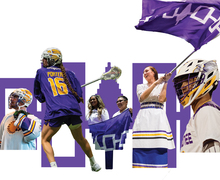Composer talks using opera to fight racial inequality
Kiran Ramsey | Design Digital Editor
More than 75 people to the Peter Graham Scholarly Commons at E.S. Bird Library on Monday.
With every chair filled, students lined the walls and sat cross-legged on the floor to watch a lecture by an opera composer. But this wasn’t Mozart or Beethoven — they were there to see Anthony Davis, composer of “X, The Life and Times of Malcolm X.”
Organizers didn’t expect the first lecture of the 2016 African American Studies Colloquium to be as popular as it was, but Davis brought more than 75 people to the Peter Graham Scholarly Commons at E.S. Bird Library on Monday.
Before even mentioning music as a part of his talk on social justice and the use of opera to fight racial inequality, Davis put up an image of the slaves depicted in one of his operas and talked about history.
“History is not just something in a book,” Davis said, “History is something we live with every day. It’s something that haunts us and shapes who we are.”
This led to a discussion of his opera “X, The Life and Times of Malcolm X.” In this opera, Davis blends jazz-influenced opera and rhythmic beats to tell the story of Malcolm X, a prominent civil rights leader during 1950s and ’60s.
Before playing a sample of music called “Malcolm’s Aria,” Davis explained that he considered Malcolm X’s emotions at the time of his first arrest when writing the piece.
“His attitude is pure rage,” Davis said. “Rage at a system that oppresses. Rage at a system that cannot recognize his talents and abilities.”
He then went on to describe that even though he wrote this opera in 1986, the message is still relevant.
“This story of rage is a story they (police) don’t want to hear. And we still face it today. Every day,” Davis said.
Although he is a jazz pianist, Davis uses opera because through opera, he is able to tell the stories of tragic heroes.
He brings his jazz influence to opera, though, illustrating a contrast between African and European music heritage. African being the rhythmic, improvised portions of his music and European being the structured, traditionally operatic part.
In fact, Davis said by introducing jazz improvisation to his opera, he “accidentally” integrated the New York City Opera.
“At the time, 1986, there was only one African American in the NYC orchestra,” Davis said. “I bring in all these people replacing the guys normally in those seats, integrating the orchestra. It was crazy.”
He also said at the opening night of his opera about Malcolm X at the Lincoln Center for the Performing Arts the audience was 45 to 50 percent African American. This was unprecedented.
His operas are non-traditional, and they attract people who do not consider themselves opera goers.
“I don’t think most people my age are exposed to opera. They don’t use opera to relate to a social movement. But I’d listen to his music,” said Nerria Howard, a freshman psychology major.
Howard alluded to the biggest takeaway Davis wanted for his lecture: his operas are meant to make people aware of racial injustice.
“Music is catharsis,” Davis said. “It forces you through the tension. The only way to make change, as Dr. King says, is to change hearts. We have to make people feel the story to know it is inacceptable.”
Published on September 27, 2016 at 1:38 am
Contact Aline: amarti22@syr.edu





